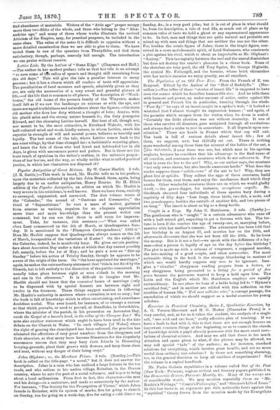The Population of an Old Pear Tree. From tho French
of E. van Bruyssel. Edited by the Author of the "Heir of Rodolyffe." (Mac- millan.)—The teller of these "stories of insect life" is supposed to have seen the scenes which he describes human-life size. And ho tells them with humour and power, an under-current of satire, satire against life in general and French life in particular, running through the whole.
"Poor fly!" he says of an insect caught in a spider's web, " it looked so wretched that I almost thought its expression human ; " and again, of the parasite which escapes from the victim whou its doom is sealed.
"Certainly the little abortion was not without dexterity. It was of those who survive all disasters, pass uninjured through all revolutions, and always find a niche to rest in somewhere. It all depends upon con- stitution." There are heads in Franco which that cap will suit. The book is full of curious details about insect life ; few of them, we suppose, now, but skilfully set out. There is nothing
more wonderful among those than the account of the habits of the ant, a IrOXITIZ6Y, if ever there was one, but which man in his egotism neglects, because he considers that his advantage is the final cause of
all creation, and contemns the creatures which do not subserve it. For what is oven the boo to the ant? Why, as our author says, the creature "not only owns slaves, but also breeds numerous herds." What dons the reader suppose these "milch-cows " of the ant to be? Why, they are plant lice or aphides. They collect the eggs of these creatures, build houses for them, rear thorn, and enjoy tho saccharous fluid which they exude. Other wonderful creatures there are on which we would gladly dwell, — the grave-digger, for instance, necropliorus vespillo. Mr.
Gloditsch observed four individuals of those species bury during a captivity of fifty days "four frogs, three birds, two fish, a mole, and two grasshoppers, besides the entrails of another fish, and two pieces of ox-lung." The insect is about as big as a dung-beetle.




























 Previous page
Previous page